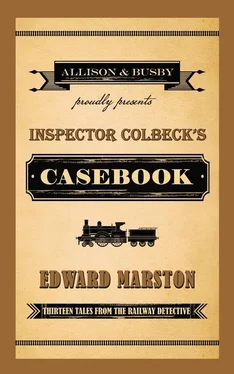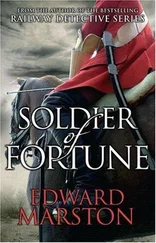Edward Marston - Inspector Colbeck's Casebook
Здесь есть возможность читать онлайн «Edward Marston - Inspector Colbeck's Casebook» весь текст электронной книги совершенно бесплатно (целиком полную версию без сокращений). В некоторых случаях можно слушать аудио, скачать через торрент в формате fb2 и присутствует краткое содержание. Год выпуска: 2014, ISBN: 2014, Издательство: Allison & Busby, Жанр: Исторический детектив, на английском языке. Описание произведения, (предисловие) а так же отзывы посетителей доступны на портале библиотеки ЛибКат.
- Название:Inspector Colbeck's Casebook
- Автор:
- Издательство:Allison & Busby
- Жанр:
- Год:2014
- ISBN:9780749014742
- Рейтинг книги:4 / 5. Голосов: 1
-
Избранное:Добавить в избранное
- Отзывы:
-
Ваша оценка:
- 80
- 1
- 2
- 3
- 4
- 5
Inspector Colbeck's Casebook: краткое содержание, описание и аннотация
Предлагаем к чтению аннотацию, описание, краткое содержание или предисловие (зависит от того, что написал сам автор книги «Inspector Colbeck's Casebook»). Если вы не нашли необходимую информацию о книге — напишите в комментариях, мы постараемся отыскать её.
Inspector Colbeck's Casebook — читать онлайн бесплатно полную книгу (весь текст) целиком
Ниже представлен текст книги, разбитый по страницам. Система сохранения места последней прочитанной страницы, позволяет с удобством читать онлайн бесплатно книгу «Inspector Colbeck's Casebook», без необходимости каждый раз заново искать на чём Вы остановились. Поставьте закладку, и сможете в любой момент перейти на страницу, на которой закончили чтение.
Интервал:
Закладка:
‘Good.’
‘When you and the sergeant have interviewed them, make your way to Berkhamsted and try to pacify Lord Stennard.’
‘We’ll do our best.’
‘A word of warning,’ said Tallis.
‘What is it, sir?’
‘I’ve met the august gentleman. He’s a peppery individual at the best of times, impatient, demanding and unpredictable. Handle him with great care or he’s likely to explode in your face.’
Without realising it, Tallis had just described himself with great accuracy, so Colbeck had to suppress a smile. After long years of coping with the superintendent’s hot temper, he felt that he was qualified to handle anybody. About to leave, he remembered something.
‘It’s rather ironic, isn’t it, sir?’
‘What is?’
‘Rain, Steam and Speed was stolen outside one of the stations on the London and North Western Railway. Yet the painting depicts a train crossing the Thames by means of the bridge at Maidenhead and that’s on the Great Western Railway. It would have been more appropriate if the crime had taken place on the GWR.’
‘Enough of your drollery!’ said Tallis, clicking his tongue. ‘And, for heaven’s sake, don’t make that observation to Lord Stennard. He hates railways. That’s why no tracks have ever been laid across his land.’
‘If he hates railways,’ said Colbeck, perplexed, ‘why does he want a painting that features a train?’
‘I wouldn’t dare to ask him.’
Lord Stennard was a tall, slim, red-faced man in his sixties with a mane of white hair. He walked slowly down one side of his gallery, inspecting each painting in turn through the monocle held to his right eye. When he reached the end of the room, he crossed to the opposite wall to examine the exquisite portrait by Sir Joshua Reynolds before moving on to one of John Constable’s landscapes. There were thirty paintings on display in the gallery. Some were owned by him but the majority were on loan for a limited period. It was less than a week before the great and the good of the county converged on Stennard Court to enjoy the private exhibition. Ostensibly, the collection was there for the benefit of his friends but, in reality, it was to satisfy his obsession with the work of great artists.
To have so many fine paintings under his roof at the same time was a source of inestimable pleasure to him and he walked up and down the gallery every day to savour the collection. This latest perambulation, however, did not yield the same excitement. When he pulled himself away from Constable, he was confronted by the yawning space reserved for one of Turner’s masterpieces, Rain, Steam and Speed. Instead of arriving to complete the exhibition, it had been snatched away. The gap on the wall made him quiver with rage.
‘Damn you, Inspector Colbeck!’ he growled. ‘Where the devil are you?’
When Colbeck and Leeming went into the room, the two couriers were seated. The younger of them, Stagg, stood to his feet but his companion, Richmore, remained in his chair. After performing the introductions, Colbeck told Stagg to sit down. The latter was dark-haired, bearded and in his thirties. But it was the surly Richmore who caught the inspector’s attention. Running to fat, he was a broad-shouldered man in his forties with, impossibly, a face even uglier than that of Victor Leeming. When the questions began, it was Richmore who supplied most of the answers. It turned out that he’d once been a policeman.
‘Why did you give the job up?’ asked Leeming.
‘Too much hard work and too little pay,’ replied Richmore.
‘There are other rewards than money.’
‘I never noticed any.’
‘Tell us exactly what happened from the moment you picked up the painting at the National Gallery,’ said Colbeck. ‘You start first, Mr Stagg.’
Stagg was quiet and hesitant but he had a good memory, even recalling the times of the departure from Euston and arrival at Berkhamsted. Richmore took over and gave a more embellished account, doing his best to shift the blame for the loss of the painting onto his colleague. He stressed that he’d had far more experience than Stagg and had an unblemished record since working at the National Gallery.
‘Why did you take the painting by train?’ asked Colbeck.
‘I thought it would be quicker and safer,’ said Richmore. ‘We sat in the brake van and guarded it like two hens sitting on a clutch of eggs.’
‘You say that the man in the carriage had a Colt revolver.’
‘That’s right, Inspector.’
‘Had you ever seen one like it before?’
‘Yes,’ said Richmore. ‘When the Great Exhibition was on, Samuel Colt was displaying his wares. I went along to see them. I wish I could have afforded to buy one. It would have been a lot more use than this.’
He pulled a weapon from inside his coat and Leeming instinctively drew back.
‘That’s an old five-shot pepperbox pistol,’ said Colbeck. ‘It’s no match for a Colt. What about you, Mr Stagg? Were you armed?’
Stagg shook his head. ‘We didn’t expect trouble.’
‘I did,’ claimed Richmore. ‘I’m always on guard.’
‘Then why did you get robbed so easily?’ asked Leeming.
‘It wasn’t my fault, Sergeant. I was distracted by Stagg.’
‘That’s not true,’ said Stagg.
‘You kept jabbering at me.’
‘No, I didn’t.’
‘Right,’ said Colbeck, taking charge, ‘this crime only took place because someone knew that you’d be catching a particular train. How many people at the National Gallery were aware of your travel arrangements?’
‘Very few,’ said Stagg, ‘and they’re all above suspicion.’
‘Did you tell anyone else where you were going today and at what time?’
‘Not a soul, Inspector — I didn’t even tell my wife or my son.’
‘ Somebody must have known,’ insisted Leeming, turning to Richmore. ‘What about you, sir? Did you mention it to your friends, perhaps, when you had a drink with them? It’s very easy to let things slip out unintentionally.’
Richmore was adamant. ‘I never speak to anyone about my work.’
It was not until they were on the train to Berkhamsted that the detectives had a moment to review at leisure what they’d been told. On one point, they were in complete agreement.
‘Richmore was lying, sir,’ said Leeming.
‘I got the feeling that he’s had plenty of practice at it.’
‘He was full of himself. When a man like that has a few beers inside him, he can’t resist boasting to his friends.’
‘I fancy they’d be more likely to be acquaintances, Victor,’ said Colbeck. ‘Who’d want to have a braggart like Richmore as a friend? Would you?’
Leeming grimaced. ‘I’d run a mile.’
‘What did you make of Stagg?’
‘I felt sorry for him. He got blamed for everything.’
‘He’s got a wife and child to support.’
‘Yes — losing his job would be a big blow.’
‘Stagg looked so unhappy.’
‘So would I if I’d had to work alongside a bully like Richmore.’
Colbeck smiled. ‘We both work alongside a bully named Tallis,’ he pointed out. ‘Did you know he was a devotee of British art?’ He saw Leeming’s eyes widen in astonishment. ‘Yes, it was a shock to me as well. Despite evidence to the contrary, the superintendent has finer feelings, after all. Going back to the theft,’ he said. ‘If Richmore really was involved, he’d need an accomplice in Hertfordshire who could hire a carriage to make off with that painting.’
‘What will the thief do with it, sir?’
‘Well, he won’t hang it up on his wall, I can assure you of that.’
‘Then why bother to steal it?’
‘I can see that you’re not familiar with Turner’s paintings. This particular one is famous and it’s inspired many artists — my wife among them. Madeleine went to see Rain, Steam and Speed at least ten times at the National Gallery. Unfortunately,’ said Colbeck, ‘her own paintings of locomotives have nothing like the same value. As for the thief, I daresay that he might try to sell it back to Lord Stennard.’
Читать дальшеИнтервал:
Закладка:
Похожие книги на «Inspector Colbeck's Casebook»
Представляем Вашему вниманию похожие книги на «Inspector Colbeck's Casebook» списком для выбора. Мы отобрали схожую по названию и смыслу литературу в надежде предоставить читателям больше вариантов отыскать новые, интересные, ещё непрочитанные произведения.
Обсуждение, отзывы о книге «Inspector Colbeck's Casebook» и просто собственные мнения читателей. Оставьте ваши комментарии, напишите, что Вы думаете о произведении, его смысле или главных героях. Укажите что конкретно понравилось, а что нет, и почему Вы так считаете.












